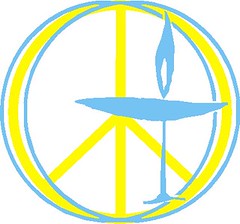Violence Begets Violence
September 13, 2012I’m sure you’ve heard the aphorism, that violence never solves anything. It is a good line, one I have previously used myself. In the long view it even has some truth to it… violence often does lead to more and more complicated problems over time.
long view it even has some truth to it… violence often does lead to more and more complicated problems over time.
The problem with it is that in the short view (and most human beings live in the short view) it is demonstrably untrue. Violence can seem, for awhile, to have solved some problems rather neatly. Violence, be it the violence of a mob in Cairo or a planned strike under the cover of a mob in Benghazi… violence can seem a viable solution to a problem, even an attractive one. Why attractive? Because somehow we continue with the myth that killing people creates some kind of finality, some kind of closure, in a visceral denial that we are all interconnected and interdependent.
And yet, I’ve come to realize that there is a deeper truth about violence, one that, in my experience, comes as close to an absolute truth of anything I have ever encountered… and that is this. Violence begets more violence. When one violence is perpetrated, it created a continuing cycle that creates more and different forms of violence, spreading out in a wave from the initial point.
In fact, I wonder if there really are very many new initial points of violence, and if rather our reality is made up of a continuing harmonic of violence stretching back to the dawn of human time.
I also want to clarify what I mean by violence, for I am talking about far more than physical violence. I might strike you, which is an act of physical violence. In reaction to my striking you, you might go home and be emotionally violent to a spouse. That spouse might then tell a child that the God they learned about in Sunday School must be dead for such things to happen, perpetrating an act of religious violence on the child’s growing faith… And on, and on, and on.
We all live in these cycles and waves of many different forms of violence each and every day of our lives. It is a spiritual practice to intentionally seek to interrupt these waves of violence when they come our way. It is a spiritual practice to notice the wave, the form of violence that is perpetrated upon you, and respond with loving kindness. It is a spiritual practice to transform that violence within your spirit.
As one person doing this, the wave will likely crash around you and flow on… but as one of millions? Perhaps we can, one day, break the cycle of violence that has plagued humanity since the dawn of our awareness. Perhaps we can break the cycle in which, in this small part of this ongoing wave of violence, an Israeli-American committed an act of religious violence upon the Islamic faith, and then many enraged by that act committed these acts of physical violence upon Americans, leading us now to political calculations around another act of military violence upon Muslims.
Without such millions of people seeking to intentionally interrupt the waves of violence of all forms, we are stuck forever battered by the surf.
Yours in faith,
Rev. David
A Personal Relationship with God
June 7, 2012The aspect of my personal faith that seems to bring about the most confusion in friends and colleagues is that I believe I have a deep and abiding personal relationship with a God that is incapable of knowing that I even exist.
abiding personal relationship with a God that is incapable of knowing that I even exist.
I find that the confusion about this theological point rests not only with those more theologically conservative than I, but also with those more theologically liberal or secular than I. More conservative ministers and theologians are confused by my claim that I can have a personal relationship with a non-personal God. My more liberal and secular colleagues question the same thing, but with the opposite emphasis.
While I have talked about this in other articles (including here), I believe that there is no division in God, that every moment of every day we are intimately involved with God; in a flight of birds, in a breath of wind, in a cab driver who cuts us off, in a moment on the Zen cushions… all one, all God. We are a part of God, and nothing can be more intimate than this. God is a holy spirit that is intimately involved in all things, and we are intimately involved in the part of God we can touch and sense.
However, God does not, in any personal way, know that I exist as an individual. I wonder whether God is even capable of “knowing” in any human sense. More, my faith in God does not require God’s knowing of me. I am “known” simply in my being, along with all of being, and together we are becoming… and becoming… and becoming.
I do not believe that God is “consciously” involved in human life, except that we are a part of God, and we are consciously involved in our own lives. Human Free Will is a part of God. What prevents us from sensing this is our own delusion of division and self… our own conflicted natures. Issues of whether God is omniscient or omnipotent depend upon God having a human understanding of knowing or of power, and I do not believe that to be true. God simply is, and we relate to God because of that.
As one minister/professor colleague of mine has said to me, this theological stance is fairly complex, and inspired by both my understanding of Christian Faith and my experience of Zen Buddhism. It is in part this belief that holds me in Unitarian Universalism, in that it inspires in me my connection to the inherent worth of all beings and the interconnectedness of all existence, two core principles of Unitarian Universalism.
A few years ago, in a communication within the Army Chaplain Corps, I found this statement: “Whereas the Chaplaincy, as spiritual leaders, model faith and belief in the Hand of God to intervene in the course of history and in individual lives;”. Now, I can do some theological circumlocutions and come to a place where I can accept that statement (if not agree with it), those circumlocutions are somewhat intensive. I certainly could not accept it in its obvious, literal intent. For me, God does not intentionally intervene in human history or individual lives… God simply is, and human history and individual lives change and mold in reaction to God’s existence. To paraphrase Albert Einstein, God does not play dice with the Universe, because God is the Universe and all within it.
If a belief in an intervening God who has a personal relationship with individual lives is a prerequisite to be a military chaplain, then perhaps I have some thinking to do about my call to ministry. If, rather, the document that quote was taken from actually is trying to define what the theological center of the Chaplain Corps is, then I accept that I am theologically on the margins but can still find a place. I will, in Unitarian Universalist prophetic tradition, continue to speak my truth, the truth that is written on my heart by my life, by scripture, by the flight of birds and the existence of evil, and let “Einstein’s Dice” fall how they may.
Yours in Faith,
Rev. David
Renew Your Membership
We invite you to join your fellow CLFers to renew your CLF membership and stewardship of the CLF for another year.
Support the CLF
Can you give $5 or more to sustain the ministries of the Church of the Larger Fellowship?
If preferred, you can text amount to give to 84-321
Newsletter Signup
About
Quest for Meaning is a program of the Church of the Larger Fellowship (CLF).
As a Unitarian Universalist congregation with no geographical boundary, the CLF creates global spiritual community, rooted in profound love, which cultivates wonder, imagination, and the courage to act.
Contact
Church of the Larger Fellowship Unitarian Universalist (CLFUU)
24 Farnsworth Street
Boston MA 02210


